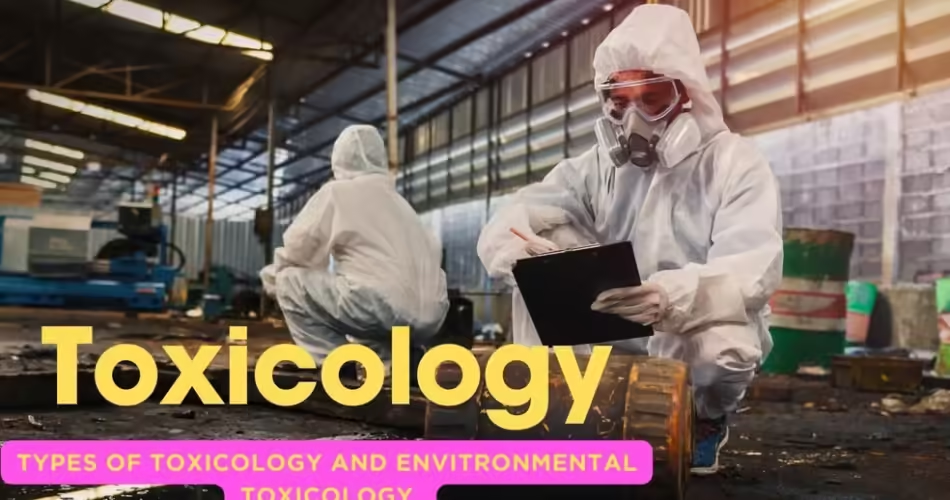This blog will tell you about the concept of Toxicology. First of all it will define Toxicology and introduce the Father of Toxicology. Then it will elaborate the main Areas of Toxicology in detail. Secondly, it will explain the Types of Toxicology briefly. Then it will tell the difference between Pharmacology and Toxicology. At the end, it will shine a light on the concept of Environmental Toxicology along with its sources with explanation. This blog will tell you about Concept, Areas, Types of Toxicology, Pharmacology and Environmental Toxicology.
Definition of Toxicology:
The traditional definition of toxicology is “The Science of Poisons”. Toxicology is a scientific discipline, overlapping with biology, chemistry, pharmacology and medicine that involves the study of adverse effects of chemical substances and living organisms and the practice of of diagnosing and treating exposures to toxins and toxicants.
Toxicology is the study, experimentation, diagnosis and treating of every toxic part of environment. It can be any gas, liquid or solid substance that is toxic for our lives.
The word toxic means poisonous. It depicts that it includes the study of every poisonous substance that can cause harmful effects to the living organisms.
Toxicology includes the study of toxic chemicals, substance or material that can be in any form. Toxicology is a vast field and it almost covers all the sciences while dealing them in the poisonous forms and their effect on all communities on the Earth. This blog contains Areas, Types, Environmental Toxicology and Pharmacology.
Father of Toxicology:
Paracelsus is known as the Father of Toxicology. He is credited as the “father of toxicology”.[16] Paracelsus likewise had a significant impact as a prophet or soothsayer, his “Forecasts” being concentrated by Rosicrucians in the seventeenth hundred years. Paracelsianism is the early present day clinical development motivated by the investigation of his works. Paracelsus sought a universal knowledge that was not found in books or faculties.
Areas of Toxicology:
There are three main areas of Toxicology:
Mechanistic Toxicology:
It is the area of toxicology in which we focus on the study of ways in which chemicals produce adverse effects and how biological systems protect themselves against adverse effects so it studies how physical agents interact with living organisms and cause toxicity.
Descriptive Toxicology:
Descriptive Toxicology is concerned with gathering toxicological information from animal experimentation so these types of experiments are used to establish how much of a chemical would cause illness or death. This uses gathering toxicological information from animal experimentation.
Regulatory Toxicology:
Regulatory toxicology assesses the public and environmental health risks stemming from the use of chemicals, drugs, pesticides, foods, and consumer products. Engaged with setting rules and guaranteeing consistence for item enlistment and reasonable fixations in food or ecological media. Poisonousness proof is the premise, however frequently manages are changed by political and legitimate contemplations, too a specialized plausibility.
These are the basic areas of Toxicology.

Types of Toxicology:
There are four types of Toxicology. These are as follows:
1.Chemical Toxicology:
It focuses on the structure of chemical agents and how they effect living organisms so the goal of chemical toxicology is to identify adverse health effects from the unintentional exposure to chemicals like environmental pollutants causing environmental pollution. It helps in understanding the nature of toxic chemicals and then remedies are found out to treat them or to eliminate them from the environment, so that it cannot harm the environment and living organisms.
2.Forensic Toxicology:
Forensic toxicology analyses biological samples to identify and quantify the presence of toxins and drugs so forensic toxicology helps in finding out the information about substances in the body of any person after death. It helps to determine the presence of any toxic drug in living organisms. It includes analysis of toxic chemicals and to know about them through experimentation so this is a useful type as it helps to know more about toxic chemicals to find a way to fight with them.
3.Occupational Toxicology:
It is study in which we study about all the toxic substances that are available to any worker at his or her workplace so Occupational diseases are the cause of deaths of millions of people every year. This type of Toxicology helps us to find the origin of occupational diseases, their effects and their prevention. It is the study of awareness about exposed chemicals to the employees at their workplace. Then it provide precautions for the employees or workers to keep them safe from toxic chemicals at their workplace.
4.Aquatic Toxicology:
Water pollution is a severe problem in many parts of the world. It analyze adverse impacts of contaminants and pollution caused by the chemicals present in aquatic environment so this works for evaluating the extent of water pollution and helps in determining the strategies to control water pollution. This study represents the toxic chemicals that are added into the water and deteriorates the water quality thus cause water pollution. It also provide remedies to prevent water pollution and build a safe aquatic environment.
5.Clinical Toxicology:
It includes the direct research on individual patient rather then overall research in toxins in humans. This involves thorough case study of a patients disease or condition so Clinical Toxicologists works on the prevention and treatment caused by chemicals and toxins. We can apply it in medical cases and it is very important when to deal with patients exposed to harmful chemicals in any way or transmission. This will help us to find a way out for the people that are harmed by chemicals.
These are main types of Toxicology that are very important in their own field.
Toxicologists
Toxicology Vs Pharmacology:
Toxicology:
- Toxicology is the study of poison so It tells us how toxic substances cause adverse effects on living organisms.
- Toxicology is a branch of Pharmacology.
- Toxicology helps us to know the base of toxins found in our environment, lifestyle etc. and so as to find ways to treat them.
- Toxicology focuses on the toxic parts of our environment and their treatment.
- Example: Adverse effects of chemical and Risk Assessments etc.
Pharmacology
- Pharmacology is the study of how drugs alter biological system so as to save it from toxic substances and conditions.
- Pharmacology is the basic discipline of Toxicology.
- Pharmacology helps us find out new drugs so as to fight with toxic substances and health conditions.
- Pharmacology focuses on drugs and effects of drugs on human body and biological systems.
- Example: Therapeutic Effects of Chemicals etc.
Environmental Toxicology:
It is a very vast and important branch of Toxicology in the present day situation. It is the study of toxins and chemicals that are present in our environment and are adversely effects the life of living organisms. Environmental toxicology has a great importance in our present day, because the earth is passing through worst environmental crises because of natural variations in climate and mainly by anthropogenic activities. These activities are increasing toxic gases, depletion of resources, land degradation and many more environmental impacts like never before. Environmental Toxicology work and analyze the potential environmental issues related to toxins and work for their prevention and elimination. This field is the need of present day world. This blog defines Areas, Types, Environmental Toxicology and Pharmacology.
Sources of Environmental Toxicology:
Following are the Sources of Environmental Toxicology:
Heavy Metals:
Heavy metals accumulates in plants, animals and soil so they become a part of environment and can harm every segment of the environment. These can pollute air, water, animals and human body. These are very toxic for our environment. Heavy metals includes Cadmium, Mercury, Lead, Arsenic etc.
Radiations:
Radiations are the form of matter that travels in the form of waves or rays so these are pure energy and high-speed particles. These can effect with the cells of the human body and can disturb the brain cells. They also effects the health of animals and plants. It can cause effects like skin cancer and skin burns etc.
Pesticides:
Pesticides are the chemicals to kill pests into the fields so these chemicals are toxic for the agricultural land and the crops. And the people who consume these polluted crops get health problems and add chemicals to the food chains of living organisms. It also disturbs the natural fertility of land.
Conclusion:
Toxicology is basically the study of poisons. It involves the study of toxins that have adverse effects on the living organisms and pollute their natural environment. Toxicology helps us to study chemical composition of toxic substances and works on their adverse impacts prevention and elimination. It studies the toxic components to introduce better alternatives and precautionary measures. It is very useful and important branch of science and is proved useful for betterment of living environment so this blog contains Areas, Types, Environmental Toxicology and Pharmacology.



Comments